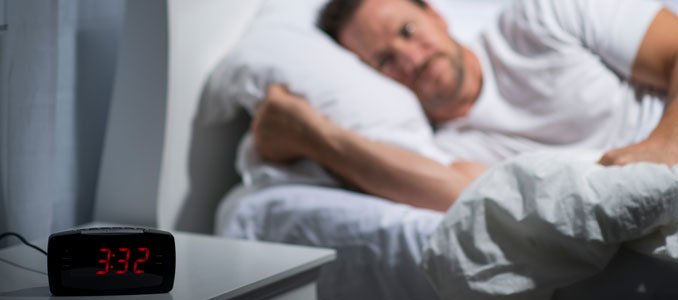PUBLISHED BY: Zahid
CREATED/VALIDATED BY: Janardan Panday
LAST UPDATED ON: Jan 19, 2016
Introduction
Insomnia is the perception or complaint of inadequate or poor quality of sleep because of difficulty in falling asleep, difficulty in maintaining sleep or waking too early in the morning. Chronic Insomnia can lead to severe fatigue, anxiety, depression and lack of concentration. Insomnia can be classified in terms of its duration. It comes under Vata nanatmaja vikara and called Anidra or Nidranasha in Ayurvedic terminology.
Sleep disorders are 1.5 times more common in persons aged more than 65 years
compared to younger counter parts and incidence in women is 1.3 times greater than in men. The prevalence of Insomnia increases steadily with age and reported by up to one in 3 people aged 65 years and above.
Insomnia can be classified as-
1. Transient Insomnia - lasting from a night to a week and is usually caused by
events which alters normal sleep pattern, such as traveling or sleeping in an unusual environment.
2. Short term Insomnia - lasts about two to three weeks and is usually attributed to emotional factors such as worry or stress.
3. Chronic Insomnia - occurs most nights and lasts a month or more.
Aetiology
Insomnia is occasionally a symptom of an underlying medical or psychological condition but it may be caused by stress or life style changes. About half of Insomnia cases have no identifiable cause. Some conditions or situations that commonly lead to Insomnia include-
1. Substance abuse; such as smoking, excessive consumption of caffeine, alcohol and recreational drugs
2. Disruption of circadian rhythms; such as shift work, change in work schedule
3. Uncomfortable and unusual sleeping environment
4. Psychiatric and neurological conditions; such as depression, manic depressive
disorder, restless leg syndrome (RLS), post traumatic stress disorders.
5. Biological factors – Due to advancement in age, the internal biological 'clock' that regulate sleep creeps slightly forward, compelling most senior citizens sleep earlier and wake up early.Reuction of physical and social activities and degenerative changes in all aspects of health may cause insomnia in advance age.
6. Sleep disordered breathing - sleep apnea
7. Chronic illness - such as congestive heart failure, chronic obstructive
pulmonary disease, heart burn, prostatic problems, menopause, diabetes, arthritis and hyperthyroidism
8. Use of certain medicins – long term use of decongestants, bronchodilators, beta blockers and sleep producing medication
9. Excessive computer work or watching Telivision.
Pathogenesis
Sleep disorders are associated with an impairment of melatonin production. Melatonin produced by the pineal gland at night, plays a role in regulation of sleep-wake cycle and diminished-melatonin secretion may cause insomnia.
Clinical features
Common symptoms of insomnia include
1. Not feeling refreshed
2. Inability to sleep despite being tired
3. Day time drowsiness, irritability, difficulty in concentrating
4. Impaired ability to perform normal activities
5. Body-ache and heaviness of the body
Complications
1. Depression
2. Anxiety disorder
3. Fatal accident
4. Increase in severity of chronic diseases VIZ. high blood pressure and diabetes
Investigations
1. Polysomnography
2. Evaluation for depression and anxiety
3. Multiple sleep latency test (MSLT)
4. Thyroid function test
5. EEG











